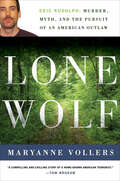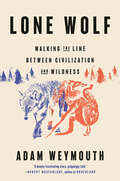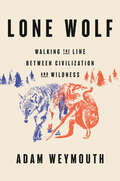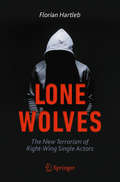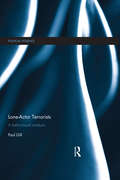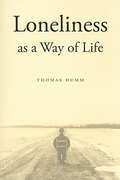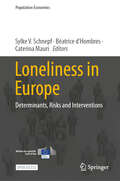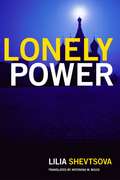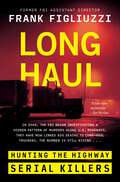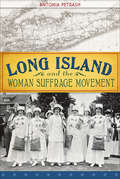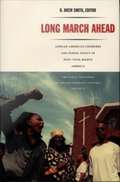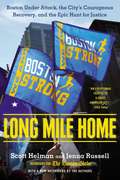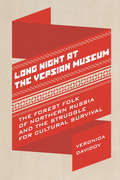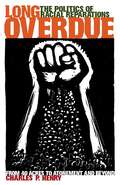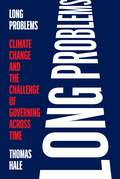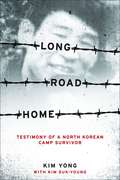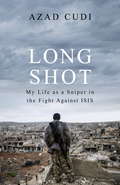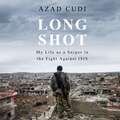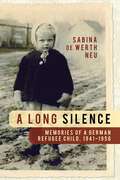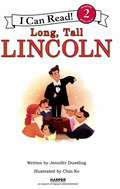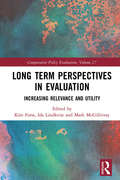- Table View
- List View
Lone Wolf: Eric Rudolph and the Legacy of American Terror
by Maryanne VollersFive years after escaping into the mountains of North Carolina, Eric Rudolph was becoming a figure of folk legend. The FBI had long since abandoned its manhunt—the largest ever on U.S. soil—for the fugitive accused of bombing the Atlanta Olympics, two abortion clinics, and a gay bar. Then, one night, Rudolph got careless; he was arrested and put in jail—possibly forever. But even in custody, he remained unrepentant . . . and an enigma.In Lone Wolf, Maryanne Vollers brings the reader deep inside one of the most sensational cases of domestic terrorism in American history. At the same time, without losing sight of the hideous nature of Rudolph's violent crimes, she successfully puts a human face on an iconic killer while exploring the painful mysteries of the heart.
Lone Wolf: Walking the Line Between Civilization and Wildness
by Adam WeymouthAn illuminating account of one wolf's journey across the Alps into Italy, and what the resurgence of wolves says about our connection to nature, immigration, and one another—from an award-winning journalist.In 2011, a wolf named Slavc left his home territory of Slovenia for a wide-ranging journey across the Alps. Tracked by a GPS collar, he traveled over 1,200 miles, where he would mate with a female wolf on a walkabout of her own—the only two wolves for hundreds of square miles—and start the first pack to call the Italian Alps home in more than a century. A decade later and there are more than a hundred wolves in the area, the result of their remarkable meeting. Now, journalist Adam Weymouth follows Slavc's path on foot, and in doing so, interrogates the fears and realities of those living on land that is being repopulated by wolves; a metaphor for economic, political, and climate upheaval in a region that is seeing a centuries-old way of life being upended. Weymouth journeys to understand how wolves—vilified throughout history in literature, art, and folklore—are slowly creeping back into our forests, woods, and sometimes even our towns, and what that deep-rooted terror at the back of our minds really means. Slavc serves as the ultimate symbol for the outsider, journeying through places that are now wrestling with an influx of immigration, a resurgence of the far-right wing, and the steady decline of the environment due to the rapid advance of climate change; the question of how we see the other and treat the earth becomes paramount in everyday lives. Examining the political dimensions that this individual animal's trek brings to light, Lone Wolf tells a newly resonant story—one less about fear and more about the courage required to seek out a new life, as well as the challenge of accepting the changing world around us.Sharply observed, searching, and written in poetic and precise prose, Lone Wolf explores the thorny connection between humans and nature, and indeed between borders themselves, and presses us to consider this much-discussed creature anew.
Lone Wolf: Walking the Line Between Civilization and Wildness
by Adam WeymouthAn intimate account of an epic walking journey through a tense and shifting Europe in the footsteps of one extraordinary wolf.In the winter of 2011, a young wolf, named Slavc by the scientists who collared him, left his natal pack's territory in Slovenia, embarking on what would become a two thousand kilometre trek to northern Italy. There, he found a mate—named Juliet—and they produced the first pack in the region in a hundred years. A decade later, captivated by Slavc's journey, Adam Weymouth set out to walk the same route. As he made his way through mountainous terrain, villages and farmland, he bore witness to the fears and harsh realities of those living on the margins of rural society at a time of deep political and social flux, for whom the surging wolf population posed an existential threat. In Lone Wolf, Weymouth interrogates how the wolf—loved and loathed, vilified and romanticized throughout history—is re-emerging in wild and cultivated landscapes; how the borders between us and them are slipping away; and what our deep-rooted fear of the mysterious creature really means.Sharply observed, searching, poetic and revealing, Lone Wolf is a story of wildness and of the human desire for order in an ever-evolving world.
Lone Wolves: The New Terrorism of Right-Wing Single Actors
by Florian HartlebAs the attacks in Norway, Munich and most recently Christchurch have shown: a new threat is now shaking liberal Western societies. Radicalized right-wing extremists – so-called lone wolves – are engaging in individually planned terror attacks. Written by an expert on terrorism and populism, this book highlights the dynamics of this new breed of terrorism. By providing in-depth insights into the biographies of individual perpetrators, it illustrates the changing profile of the typical lone terrorist. This new kind of terrorist engages in violence without being a member of a party or organization, yet is radicalized by a global right-wing subculture that communicates in virtual networks. This startling and well-written book reveals the ideological roots of lone wolf terrorism and urges governments and civil society to take the threat seriously and implement suitable countermeasures.
Lone-Actor Terrorists: A behavioural analysis (Political Violence)
by Paul GillThis book provides the first empirical analysis of lone-actor terrorist behaviour. Based upon a unique dataset of 111 lone actors that catalogues the life span of the individual’s development, the book contains important insights into what an analysis of their behaviours might imply for practical interventions aimed at disrupting or even preventing attacks. It adopts insights and methodologies from criminology and forensic psychology to provide a holistic analysis of the behavioural underpinnings of lone-actor terrorism. By focusing upon the behavioural aspects of each offender and by analysing a variety of case studies, including Anders Breivik, Ted Kaczynski, Timothy McVeigh and David Copeland, this work marks a pointed departure from previous research in the field. It seeks to answer the following key questions: Is there a lone-actor terrorist profile and how do they differ? What behaviours did the lone-actor terrorist engage in prior to his/her attack and is there a common behavioural trajectory into lone-actor terrorism? How ‘lone’ do lone-actor terrorists tend to be? What role, if any, does the internet play? What role, if any, does mental illness play? This book will be of much interest to students of terrorism/counter-terrorism studies, political violence, criminology, forensic psychology and security studies in general.
Loneliness as a Way of Life
by Thomas DummThe modern individual, Dumm suggests, is fundamentally a lonely self. Through reflections on philosophy, political theory, literature, and tragic drama, he proceeds to illuminate a hidden dimension of the human condition.
Loneliness in Europe: Determinants, Risks and Interventions (Population Economics)
by Sylke V. Schnepf Béatrice D’Hombres Caterina MauriThis open-access volume accompanies the microdata release of the EU Loneliness Survey. Loneliness, often referred to as the ‘epidemic of the 21st century’, has emerged as a grave public health concern. For years, a lack of comprehensive European cross-national data hindered a thorough examination of this issue. In 2022, the European Commission's Joint Research Centre conducted the inaugural EU Loneliness Survey, covering around 30,000 individuals in 27 European nations. The book sheds light on who is most affected by loneliness, identifies contributing experiences and behaviours, addresses the stigmatisation of loneliness and discusses its societal impact. Furthermore, it emphasises the importance of interventions to combat loneliness. Finally, the book discusses the challenges of survey design and offers valuable insights for the monitoring of loneliness in Europe in the future. This makes the book a must-read for scholars and academics interested in population economics, public health and social well-being.
Lonely Power
by Lilia ShevtsovaAdapted from the Russian edition, this book analyzes the dominant stereotypes and myths that formed during the Putin presidency and that continue to hamper our understanding of Russia's current situation.Author Lilia Shevtsova explains the origins of such political clichés as Russia is not mature enough for democracy; Capitalism first, and democracy will follow; The humiliation of Russia by the West is the key cause of their soured relationship; Arms talks between Russia and the United States will help to reset the relationship. Shevtsova argues that an anti-mythology campaign is needed to deepen the understanding of Russia both within the Russian Federation and in the West, as well as to help nations build better policies toward Russia.
Lonergan in the World
by James MarshIn his philosophical classic Insight, Catholic philosopher and theologian Bernard Lonergan introduced the concept of self-appropriation - the personal search for knowledge of the self, and through that of the world - as the basis for systematic philosophical investigation.In Lonergan in the World, James L. Marsh argues, clearly and passionately, that self-appropriation can serve as the basis for philosophical, ethical, and even political and economic thought. Comparing and applying Lonergan's principles to major trends in contemporary philosophy, including phenomenology, hermeneutics, postmodernism, analytic philosophy, and Marxism, Marsh uncovers the philosophical and the socio-political implications of Lonergan's work and its value as the basis for a search for justice and self-understanding.Drawing on Marsh's more than forty years of studying and teaching Lonergan's thought, Lonergan in the World is a book that should be read not just by philosophers and theologians, but by anyone interested in the philosophical foundations of a just and authentic life.
Long Haul: Hunting the Highway Serial Killers
by Frank Figliuzzi"A true-crime masterpiece." —Don WinslowFrom the FBI’s former assistant director, a shocking journey to the dark side of America’s highways, revealing the FBI Highway Serial Killings Initiative’s hunt for the long-haul truckers behind an astonishing 850 murders–and counting.In 2004, the FBI was tipped off to a gruesome pattern of unsolved murders along American roadways. Today at least 850 homicides have been linked to a solitary breed of predators: long-haul truck drivers. They have been given names like the “Truck Stop Killer,” who rigged a traveling torture chamber in the rear of his truck and is suspected to have killed fifty women, and “The Interstate Strangler,” who once answered a phone call from his mother while killing one of his dozen victims. The crisis was such that the FBI opened a special unit, the Highway Serial Killings Initiative. In many cases, the victims—often at-risk women—are picked up at truck stops in one jurisdiction, sexually assaulted and murdered in another, and dumped along a highway in a third place. The transient nature of the offenders and multiple jurisdictions involved make these cases incredibly difficult to solve.Based on his own on-the-ground research and drawing on his twenty-five-year career as an FBI special agent, Frank Figliuzzi investigates the most terrifying cases. He also rides in a big-rig with a long-haul trucker for thousands of miles, gaining an intimate understanding of the life and habits of drivers and their roadside culture. And he interviews the courageous trafficked victims of these crimes, and their inspiring efforts to now help others avoid similar fates.Long Haul is a gripping exploration of a violent, disordered world hiding in plain sight, and the heroes racing to end the horror. It will forever unsettle how you travel on the road.
Long Haul: Lessons from public life
by John BrumbyThe Long Haul distils a series of practical lessons on leadership and public life from John Brumby's thirty years in politics. It offers insights into the challenges and opportunities Australia currently faces and argues for real political reform, a different future for our federation and strong leadership in a world in transition.
Long Island and the Woman Suffrage Movement
by Antonia PetrashAn account of how the women’s rights movement found fertile ground on Long Island and succeeded thanks to the suffragettes’ classic grassroots campaign. For seventy-two years, American women fought for the right to vote, and many remarkable ladies on Long Island worked tirelessly during this important civil rights movement. The colorful—and exceedingly wealthy—Alva Vanderbilt Belmont was undoubtedly the island’s most outspoken and controversial advocate for woman suffrage. Ida Bunce Sammis, vigorous in her efforts, became one of the first women elected to the New York legislature. Well-known Harriot Stanton Blatch, daughter of Elizabeth Cady Stanton, worked with countless other famous and ordinary Long Islanders to make her mother’s quest a reality. Author Antonia Petrash tells the story of these and other women’s struggle to secure the right to vote for themselves, their daughters and future generations of Long Island women.
Long Live the Post Horn!
by Vigdis Hjorth"Vigdis Hjorth is one of my favorite contemporary writers." – Sheila Heti, author of Motherhood and How Should a Person Be?From the author of the 2019 National Book Award Longlisted Will and TestamentEllinor, a 35-year-old media consultant, has not been feeling herself; she's not been feeling much at all lately. Far beyond jaded, she picks through an old diary and fails to recognise the woman in its pages, seemingly as far away from the world around her as she's ever been. But when her coworker vanishes overnight, an unusual new task is dropped on her desk. Off she goes to meet the Norwegian Postal Workers Union, setting the ball rolling on a strange and transformative six months.This is an existential scream of a novel about loneliness (and the postal service!), written in Vigdis Hjorth's trademark spare, rhythmic and cutting style.
Long March Ahead: African American Churches and Public Policy in Post-Civil Rights America
by R. Drew SmithAnalyzing the extensive data gathered by the Public Influences of African American Churches project, which surveyed nearly two thousand churches across the country, Long March Ahead assesses the public policy activism of black churches since the civil rights movement. Social scientists and clergy consider the churches' work on a range of policy matters over the past four decades: affirmative action, welfare reform, health care, women's rights, education, and anti-apartheid activism. Some essays consider advocacy trends broadly. Others focus on specific cases, such as the role of African American churches in defeating the "One Florida" plan to end affirmative action in college admissions and state contracting or the partnership forged between police and inner-city black ministers to reduce crime in Boston during the 1990s. Long March Ahead emphasizes the need for African American churches to complement the excellent work they do in implementing policies set by others by getting more involved in shaping public policy. The contributors explore the efficacy of different means of public policy advocacy and social service delivery, including faith-based initiatives. At the same time, they draw attention to trends that have constrained political involvement by African American churches: the increased professionalization of policy advocacy and lobbying, the underdevelopment of church organizational structures devoted to policy work, and tensions between religious imperatives and political activism. Long March Ahead takes an important look at the political role of African American churches after the great policy achievements of the civil rights era. Contributors Cathy J. Cohen Megan McLaughlin Columba Aham Nnorum Michael Leo Owens Desiree Pedescleaux Barbara D. Savage R. Drew Smith Emilie Townes Christopher Winship
Long Mile Home: Boston Under Attack, the City's Courageous Recovery, and the Epic Hunt for Justice
by Scott Helman Jenna RussellIn the tradition of 102 Minutes and Columbine, the definitive book on the Boston Marathon bombing and subsequent manhunt for the Tsarnaev brothers, written by reporters from The Boston Globe and published to coincide with the first anniversary of the tragedy.<P> <P>Long Mile Home will tell the gripping story of the tragic, surreal, and ultimately inspiring week of April 15, 2013: the preparations of the bombers; the glory of the race; the extraordinary emergency response to the explosions; the massive deployment of city, state, and federal law enforcement personnel; and the nation's and the world's emotional and humanitarian response before, during, and after the apprehension of the suspects.<P> The authors, both journalists at The Boston Globe, are backed by that paper's deep, relentless, and widely praised coverage of the event. Through the eyes of seven principal characters including the bombers, the wounded, a victim, a cop, and a doctor, Helman and Russell will trace the distinct paths that brought them together. With an unprecedented level of detail and insight, the book will offer revelations, insights, and powerful stories of heroism and humanity. <P> Long Mile Home will also highlight the bravery, resourcefulness, and resiliency of the Boston community. It will portray the city on its worst day but also at its best.
Long Night at the Vepsian Museum: The Forest Folk of Northern Russia and the Struggle for Cultural Survival
by Veronica DavidovThis book takes readers to the village of Sheltozero in northern Russia. It highlights a tiny community of indigenous people called Veps, known colloquially as "the forest folk" for their intense closeness and affiliation with the forests in their ancestral territories. Davidov uses a tour of the local museum to introduce a cast of human and non-human characters from traditional Vepsian culture, while journeying through various eras under Russian, Finnish, Soviet, and post-Soviet rule. In the process, she explores how contemporary political struggles mesh with traditional beliefs, illustrating how Veps make meaning of their history and unfolding future. A documentary entitled Museum Night is available for instructors who wish to incorporate it into their teaching.
Long Overdue: The Politics of Racial Reparations
by Charles P. HenryAn investigation of America’s failure to atone for the wrongs of slaveryEver since the unfulfilled promise of “forty acres and a mule” after the Civil War, America has consistently failed to compensate Black Americans for the wrongs of slavery. Exploring why America has struggled to confront the issue of racial injustice, Long Overdue provides a history of the racial reparations movement and shows why it is more relevant now than ever.Through an examination of Americans’ unwillingness to address economic injustice, Charles P. Henry crafts a skillful moral, political, economic, and historical argument for African American reparations, focusing on successful political cases. In the wake of successes in South Africa and New Zealand, new models for reparations have found traction in a number of American cities and states, from Dallas to Baltimore and Virginia to California. By looking at other dispossessed groups—Native Americans, Holocaust survivors, and Japanese internment victims in the 1940s—Henry shows how some groups have won the fight for reparations, and explores new ways forward for Black Americans. From Hurricane Katrina to Hurricane Harvey, the events of the 21st century continue to show that the legacy of racial segregation and economic disadvantage is never far below the surface in America. As the issue of reparations is brought to the national stage by figures such as Ta-Nehisi Coates and Kamala Harris, Long Overdue provides a must-read survey of the political and legislative efforts made toward reparations over the course of American history, and offers a new path toward establishing equality for all Black Americans.
Long Problems: Climate Change and the Challenge of Governing across Time
by Thomas HalePolitical strategies for tackling climate change and other &“long problems&” that span generationsClimate change and its consequences unfold over many generations. Past emissions affect our climate today, just as our actions shape the climate of tomorrow, while the effects of global warming will last thousands of years. Yet the priorities of the present dominate our climate policy and the politics surrounding it. Even the social science that attempts to frame the problem does not theorize time effectively. In this pathbreaking book, Thomas Hale examines the politics of climate change and other &“long problems.&” He shows why we find it hard to act before a problem&’s effects are felt, why our future interests carry little weight in current debates, and why our institutions struggle to balance durability and adaptability. With long-term goals in mind, he outlines strategies for tilting the politics and policies of climate change toward better outcomes.Globalization &“widened&” political problems across national boundaries and changed our understanding of politics and governance. Hale argues that we must make a similar shift to understand the &“lengthening&” of problems across time. He describes tools and strategies that can, under certain conditions, allow policymakers to anticipate future needs and risks, make interventions that get ahead of problems, shift time horizons, adapt to changing circumstances, and set forward-looking goals that endure. As the climate changes, politics must, too. Efforts to solve long-term problems—not only climate change but other issues as well, including technology governance and demographic shifts—can also be a catalyst for a broader institutional transformation oriented toward the long term. With Long Problems, Hale offers an essential guide to governing across time.
Long Road Home: Testimony of a North Korean Camp Survivor
by Yong KimKim Yong shares his harrowing account of life in a labor camp-a singularly despairing form of torture carried out by the secret state. Although it is known that gulags exist in North Korea, little information is available about their organization and conduct, for prisoners rarely escape both incarceration and the country alive. Long Road Home shares the remarkable story of one such survivor, a former military official who spent six years in a gulag and experienced firsthand the brutality of an unconscionable regime. As a lieutenant colonel in the North Korean army, Kim Yong enjoyed unprecedented privilege in a society that closely monitored its citizens. He owned an imported car and drove it freely throughout the country. He also encountered corruption at all levels, whether among party officials or Japanese trade partners, and took note of the illicit benefits that were awarded to some and cruelly denied to others. When accusations of treason stripped Kim Yong of his position, the loose distinction between those who prosper and those who suffer under Kim Jong-il became painfully clear. Kim Yong was thrown into a world of violence and terror, condemned to camp No. 14 in Hamkyeong province, North Korea's most notorious labor camp. As he worked a constant shift 2,400 feet underground, daylight became Kim's new luxury; as the months wore on, he became intimately acquainted with political prisoners, subhuman camp guards, and an apocalyptic famine that killed millions. After years of meticulous planning, and with the help of old friends, Kim escaped and came to the United States via China, Mongolia, and South Korea. Presented here for the first time in its entirety, his story not only testifies to the atrocities being committed behind North Korea's wall of silence but also illuminates the daily struggle to maintain dignity and integrity in the face of unbelievable hardship. Like the work of Solzhenitsyn, this rare portrait tells a story of resilience as it reveals the dark forms of oppression, torture, and ideological terror at work in our world today.
Long Shot: My Life As a Sniper in the Fight Against ISIS
by Azad CudiIn September 2014, Azad Cudi became one of seventeen snipers deployed when ISIS, trying to shatter the Kurds in a decisive battle, besieged the northern city of Kobani. In LONG SHOT, he tells the inside story of how a group of activists and idealists withstood a ferocious assault and, street by street, house by house, took back their land in a victory that was to prove the turning point in the war against ISIS. By turns devastating, inspiring and lyrical, this is a unique account of modern war and of the incalculable price of victory as a few thousand men and women achieved the impossible and kept their dream of freedom alive.
Long Shot: My Life As a Sniper in the Fight Against ISIS
by Azad CudiIn September 2014, Azad Cudi became one of seventeen snipers deployed when ISIS, trying to shatter the Kurds in a decisive battle, besieged the northern city of Kobani. In LONG SHOT, he tells the inside story of how a group of activists and idealists withstood a ferocious assault and, street by street, house by house, took back their land in a victory that was to prove the turning point in the war against ISIS. By turns devastating, inspiring and lyrical, this is a unique account of modern war and of the incalculable price of victory as a few thousand men and women achieved the impossible and kept their dream of freedom alive.
Long Silence: Memories of a German Refugee Child, 1941-1958
by Sabina De NeuAfter more than sixty years, the nightmarish sufferings of so many victims of Germany's Nazi regime have been documented extensively. Rarely, however, does one hear about the experiences of German children during World War II. Coming of age amidst the chaos, brutality, and destruction of war in their homeland, they had no understanding of what was happening around them and often suffered severe trauma and physical abuse.This haunting memoir tells the riveting story of one such German child. Born in Berlin in 1941, Sabina de Werth Neu knew little during her earliest years except the hardships and fear of a war refugee. She and her two sisters and mother were often on the run and sometimes homeless in the bombed-out cities of wartime Germany. At times they lived in near-starvation conditions. And as the Allies stormed through the crumbling German defenses, the mother and children were raped and beaten by marauding Russian soldiers.After the war, like so many Germans, they wrapped themselves in a cloak of deafening silence about their recent national and personal history, determined to forget the past. The result was that Sabina spent much of her time wrestling with shame and bouts of crippling depression. Finally, after decades of silence, she could no longer suppress the memories and began reconstructing her young life by writing down what had previously seemed unspeakable. Illustrated by vintage black-and-white family photographs, the book is filled with poignant scenes: her abused but courageous mother desperately trying to protect her children through the worst, the sickening horror of viewing Holocaust footage on newsreels shortly after the war, the welcome sight of American troops bringing hot meals to local schools, and the glimmer of hope finally offered by the Marshall Plan, which the author feels was crucial to her own survival and that of Germany as a whole. This book not only recalls the experiences of a now-distant war, but also brings to mind the disrupting realities of present-day refugee children. There is perhaps no more damning indictment of war than to read about its effects on children, its helpless victims.
Long Story Short: Turning Famous Books into Cartoons
by Mr. FishA collection of cartoons, illustrations, and paintings that condense the complicated narratives of famous books into one-page works of art."A subversive volume that translates a series of complex works of literature into a single-page illustration . . . A variety of artists rise to a unique literary and visual challenge." —Kirkus ReviewsThe Catcher in the Rye. Lolita. Moby-Dick. Infinite Jest. I Know Why the Caged Bird Sings. A Room of One’s Own. Native Son. These are but a handful of classic works spectacularly distilled by Mr. Fish and a very talented group of painters, illustrators, graphic designers, and political cartoonists into succinct snapshots that are at times funny, sad, inspiring, rude, crude, beautiful, profound, stomach-turning, and mind-blowing.Includes original artwork from: Mr. Fish, Ted Rall, Stephanie McMillan, Sarah Awad, Eli Valley, Wes Tyrell, Tamara Knoss, Keith Henry Brown, Sam Henderson, Lodi Marasescu, Surag Ramachandran, Tami Knight, Eric J. Garcia, Marissa Dougherty, Siri Dokken, John G., Andy Singer, Tara Seibel, Gary Dumm, Clare Kolat, Nate Ulsh, Benjamin Slyngstad, Ron Hill, JP Trostle, John Kovaleski, and Beth McCaskey.
Long Tall Lincoln (I Can Read Level 2 Ser.)
by Jennifer DusslingAbraham Lincoln didn't look like a president. He didn't always act like a president, either-he liked to wrestle with his sons and tell jokes. But he always fought for fairness, freedom, and unity. Beginning readers will learn about the milestones in Abraham Lincoln's life in this Level Two I Can Read biography, which combines a traditional, illustrated narrative with historical photographs at the back of book. Complete with a timeline, photographs, and little-known facts about the United States' sixteenth president: the long and tall Abraham Lincoln. Long, Tall Lincoln is a Level Two I Can Read, geared for kids who read on their own but still need a little help.
Long Term Perspectives in Evaluation: Increasing Relevance and Utility (Comparative Policy Evaluation)
by Mark McGillivray Kim Forss Ida LindkvistLong Term Perspectives in Evaluation is the first book to advocate the virtues of a long-term perspective for policy evaluation as well as to show how evaluations can take a longer time perspective than they usually do. To get there, it is necessary to understand the decision-making context of evaluations and study the obstacles and the resistance toward long-term perspectives – as knowledge of that will lay the ground for more effective advocacy. The book is divided into three parts: the first section examines different aspects of methodology and methods. In the next section, authors present case studies of long-term evaluations, examine their own experiences of such evaluations and discuss difficulties, challenges and lessons learned. Cases discussed include: education sector reforms in Sweden, local governance reforms in Denmark, policy interventions in Southern Italy and Brazil, and Paris Declaration Principles of aid effectiveness such as Swedish aid to Tanzania, Vietnam, Laos and Sri Lanka. Finally, the third section sees the authors turn to a set of contextual issues and concluding remarks. Bringing together a rich collection of insights and a renowned group of experts, Long Term Perspectives in Evaluation: Increasing Relevance and Utility, constitutes a significant landmark in the field.
